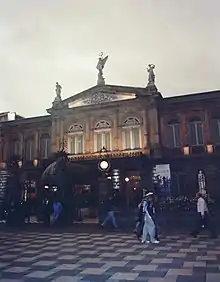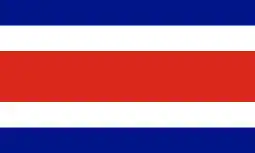Costa Rica in the OTI Festival
Costa Rica and its two OTI member stations Teletica and Repretel debuted in the OTI Festival in 1976 in Acapulco, one year later than most of its Central American neighbours. The first Costa Rican entrant in the song contest was Felix Ángel with a patriotic song called "Patria" (Homeland) which didn't receive a warm reception by the juries and placed 13th, scoring only two points. Since their debut, this country took part in every edition of the event until the last edition, which was held again in Acapulco.[1]

| Costa Rica | |
|---|---|

| |
| Participating broadcaster | Teletica Repretel |
| Participation summary | |
| Appearances | 24 |
| First appearance | 1975 |
| Highest placement | 2nd in 1997 |
| External links | |
| Teletica Website Repretel Website | |
Costa Rica hosted the OTI Contest in 1998 and the venue was the National Theatre of San José. The stage was dark colored with a blue floor. The orchestra zone was in the background.
History
Costa Rica never managed to win the festival but the country enjoyed some successes. In 1980, in Buenos Aires, the singer Ricardo Padilla achieved fourth place, with the song "El amor se va" (Love goes away) scoring 29 points. Two years later in Lima, the capital of Peru, the same singer returned to the event, again placing fourth with the song "La mujer de mi vida" (The woman of my life).[2]
One of the biggest Costa Rican successes came in 1986, in Santiago with Cristina Gutiérrez and her song "Bendito seas, varón" (Be blessed, man) which placed third.[3]
Eleven years earlier, in Lima, in 1977, the singer Erick León recorded Costa Rica's highest place ever, placing second with his song "La hora cero" (The zero hour) which was warmly welcomed by the juries.[4]
Contestants
| Year | Artist | Place | Place | Pts |
|---|---|---|---|---|
| 2000 | Luis Fernando Piedra | Como la marea (Just like the tide) | ||
| 1998 | Ana Yancy Contreras and | Vendiendo Ilusiones
(Selling illusions) |
||
| 1997 | Erick León | La hora cero (The zero hour) | 2 | |
| 1996 | Sergio Coto | Que bonito sería
(How beautiful it would be) |
||
| 1995 | Rafael Dubón | El buen Felipe (The good Philip) | ||
| 1994 | Ricardo Padilla | Como vino, se fue
(Just how she came, she went away) |
||
| 1993 | Luis Fernando Piedra | Yo soy América (I'm America) | ||
| 1992 | Rodolfo González | Igual que una mujer enamorada
(Just like a woman in love) |
||
| 1991 | Angelus | Todo para ti (All for you) | SF | |
| 1990 | Alejandro Ulate | Promesa de amor (Love promise) | ||
| 1989 | Allan MacPherson | Denme una guitarra
(Give me a guitar) |
||
| 1988 | Frank Victory | Hoy le canto al mundo
(I sing to the world) |
10 | |
| 1987 | Hilda Chacón Mata | Soy de un país que ama
(I'm from a country that loves) |
||
| 1986 | Cristina Gutiérrez | Bendito seas, varón (Be blessed, man) | 3 | |
| 1985 | Edgar Eduardo Vega | Dama y Caballero
(Lady and gentleman) |
||
| 1984 | Álvaro Esquivel | Para el ciego del acordeón
(For the blind man with the accordion) |
||
| 1983 | Manuel Chamorro | Gracias amor (Thank you love) | ||
| 1982 | Ricardo Padilla | La mujer de mi vida
(The woman of my life) |
4 | 22 |
| 1981 | Juan Carlos Wong | Cantaré (I will sing) | 14 | 8 |
| 1980 | Ricardo Padilla | El amor se va (Love goes away) | 4 | 29 |
| 1979 | Claudia | Vivamos hoy (We were living today) | 19 | |
| 1978 | Fernando Vargas | Nunca hacia atrás (never backwards) | 13 | |
| 1977 | Manuel Chamorro | Melodía de los amantes
(Melody of the lovers) |
17 | |
| 1976 | Felix Ángel | Patria (Homeland) | 13 |
References
- Zaldívar, Mario (2006). Costarricenses en la música: conversaciones con protagonistas de la musica popular 1939-1965 (in Spanish). Editorial Universidad de Costa Rica. ISBN 9789968936002.
- "Ricardo Padilla". Noticias RedCultura.com (in Spanish). Retrieved 2017-06-20.
- "Cristina gutiérrez regresó" (in Spanish). Retrieved 2017-06-20.
- "Costa Rica fue segunda en OTI" (in Spanish). Retrieved 2017-06-20.